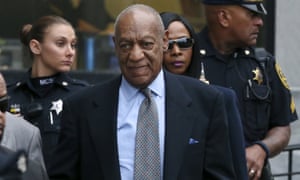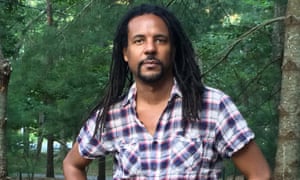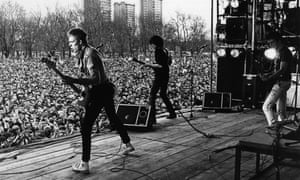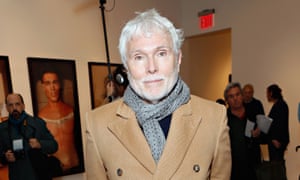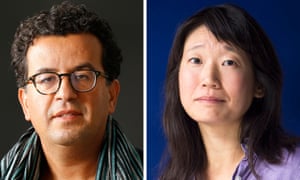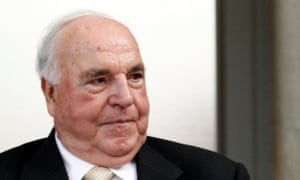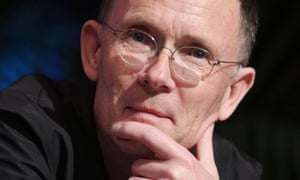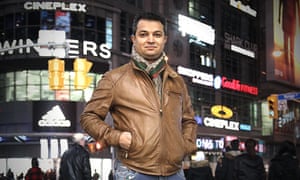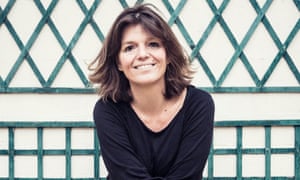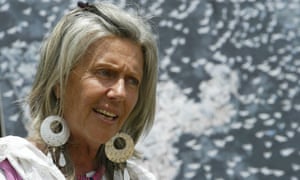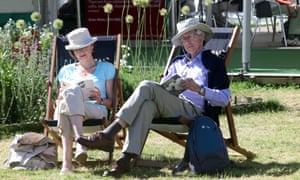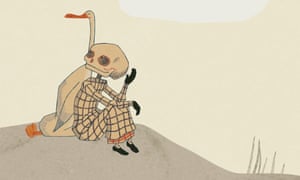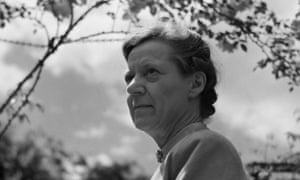A year ago, the Israeli novelist Dorit Rabinyan was at the centre of an unexpected storm. Her third book, All the Rivers – about a relationship between a Palestinian artist, Hilmi, and an Israeli woman, Liat – had been selected for the national curriculum. Then, abruptly, it was withdrawn by the education ministry because of its subject matter.
That attempt at censorship – as Rabinyan acknowledges – had its positive aspect. Sales of her novel have doubled since it became a cause célèbre in Israel’s culture wars in January 2016. Now being translated into 20 languages, it was published in the UK last month. And Rabinyan is preparing to set off on a month’s book tour of the US.
Her treatment was of a piece with how the rightwing coalition Israeli government of Benjamin Netanyahu has taken aim at the media and the arts, as well as at documentary makers and critical NGOs it does not like.
While there are things that Rabinyan would rather forget – including the threats she received – the 14 months since the book was rejected from the school curriculum have heightened her perspective, she says. “I still find it overwhelming. I guess the months that have passed since have made me acknowledge the reasons for the banning. It made me look at the current situation in Israel.”
For Rabinyan, that has meant examining how art in Israel has come to be regarded by some as dangerous.
“Art and literature are about a magical appeal to identity and empathy. How an identity in literature is transferred into your own identity so that you care for a fictional stranger so that you get into his skin and wear his gaze. This is what is so powerful. It is an antidote to the armoury we are requested to put on. This shield of ignorance and indifference and apathy. Because if you really sense everything, if you don’t wear this shield, it is painful.”
It is that appeal to empathy, she suggests, that led to her novel being perceived on the right as a threat to modern Israel. Sitting in a cafe in Habima Square, Tel Aviv, Rabinyan recalls the moment she learned that her book was regarded as a subversive, though for her it had a different meaning: the desire to memorialise a Palestine artist whom she had met in New York and who died suddenly.
“I received a call from the reporter on the Israeli newspaper Haaretz who would expose the whole affair. To be honest, we were laughing at first because the reasons given for rejecting the book seemed so absurd. That this book of mine was a threat to the Jewish separate identity. Because it might encourage young readers to get intimately involved with non-Jewish residents of the country,” she says.
But that is precisely how the pedagogical committee of Israel’s education ministry – in a decision supported by the far-right education minister Naftali Bennett – judged the book.
In the written explanation for rejecting her novel, the education ministry official, Dalia Fenig, said: “Intimate relations, and certainly the available option of institutionalising them by marriage and starting a family – even if that does not happen in the story – between Jews and non-Jews, are seen by large portions of society as a threat on the separate identities (of Arabs and Jews).”
The ministry eventually took a small step back, allowing individual teachers to use the book in schools if they wanted to, but for Rabinyan the damage had already been done. The irony, she says, is that those who set themselves against her book fundamentally misunderstood one of its key themes: the fear of the loss of identity.
“Jews, by being exiled, had to preserve their separate identities among the communities that they lived in. They had to have abstract boundaries and this concept of isolation is reflected in the novel. My character, Liat, embodies this fear of being lost. Having her identity swallowed by the loved one. The fact he is a Palestinian and she has this idea of herself – it reflects something important. You can take the girl out of the Middle East but you can’t take the walls of the gate out of the girl. As a reason for not being taught, it was a good irony!”
Rabinyan draws a distinction between identity and the notion of identity summoned up by nationalist politicians, which she describes as being “like a shadow that sinks in”.
While she was writing, she had a book by the French philosopher Emmanuel Levinas on her table. “He teaches us that we can redeem our humanity by not just caring about our own perspective but by seeing details of the other individual in the mass of humans.”
Today, Rabinyan frames the reaction to her novel in terms of a wider campaign by ministers in Netanyahu’s government to target funding and support for arts that do not reflect their right-wing views.
On the day we meet, a new controversy is brewing over funding for film and documentary production, now in the crosshairs of the abrasive culture minister, Miri Regev, after the broadcasting of a new documentary series – Megiddo – following the lives of Palestinian security prisoners.
Rabinyan blames the crackdown on free speech and expression on Netanyahu, comparing his ministers to apprentices. “They are very threatened by perspectives that allow knowing of the other.”
She characterises cultural trends in depressing terms. “It is a very efficient conspiracy to numb elements of the Israeli mind so they are unaware of how much they are being manipulated. How much they serve the motivations and ambitions of politicians who are empowered by that ignorance.”
If the controversy around her book still surprises her, it is because she set out to write something intensely personal. Its genesis was the death in a drowning accident of Hassan Hourani, which prompted Rabinyan to write a long article for the Guardian in 2005.
“I wanted to revive a memory of a person I knew in New York. He was a Palestinian artist whose life was lost a few months after I met him. I felt responsible for being witness to his last month. The novel was an act of rescue. I don’t consider myself to be brave. I feel the need to say I find friendship to be superior to romantic love, especially for individuals from a conflict involving life and death.”
The involvement of education minister Bennettis felt viscerally by Rabinyan. “He is my nemesis. I never felt I would say that … I was at an event and hid behind a curtain so we wouldn’t have to shake hands. But Rabinyan has received support from unexpected places. “I got a letter from Angela Merkel, who had read the German translation. They are such unexpected outcomes. I am banned by an Israeli politician while the German leader is an avid reader.”
Finally, what seems to trouble Rabinyan most is not her own part in the recent culture wars but the cumulative effect of the desire by some of Israel’s political leadership to shutter debate.
The result, she says, is not only the rejection of part of Israel’s present but its future as well. “If you allow only one perspective, you narrow the world. [Then] something is missing for us to interpret our future. Where we are heading.”
Dorit Rabinyan’s All the Rivers is published by Serpentine
